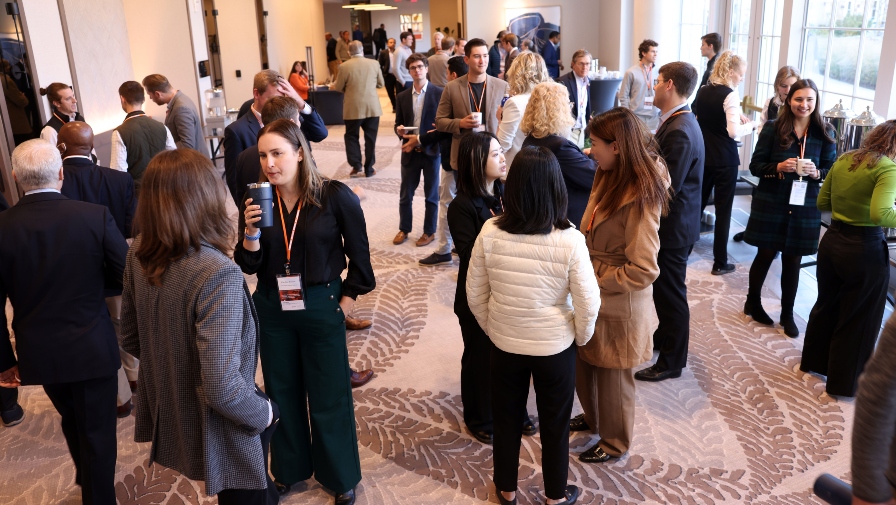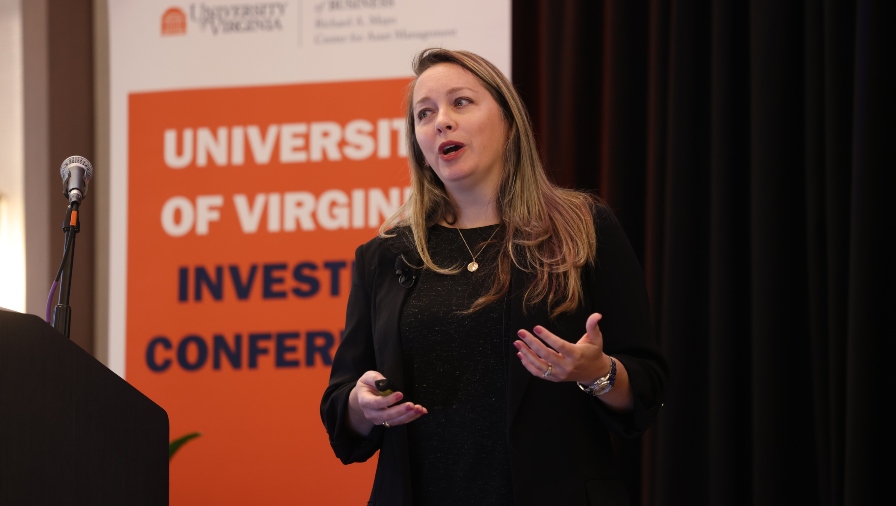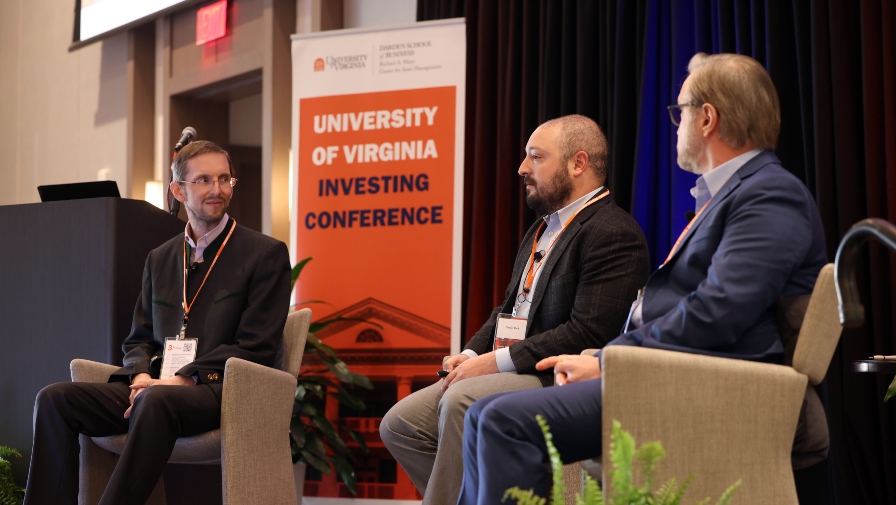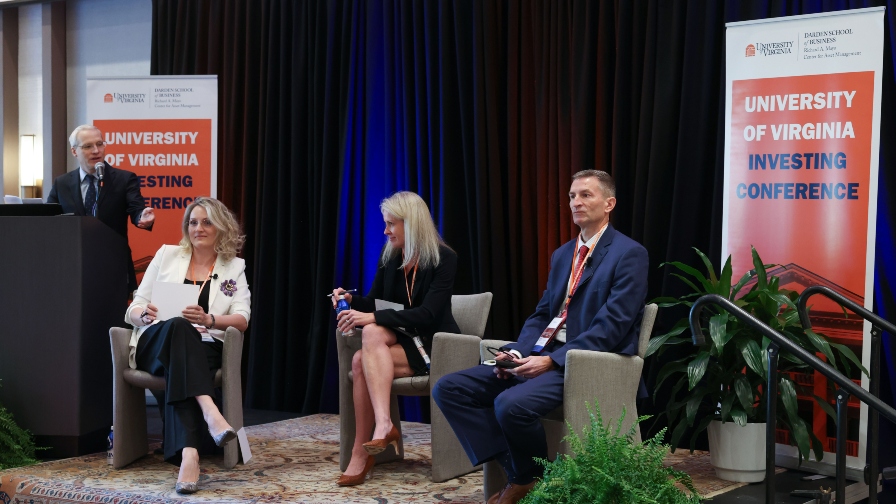[ad_1]
Escalating geopolitical tensions and the implications of the rapid rise of artificial intelligence dominated discussion at the annual University of Virginia Investing Conference, held 3 November at The Forum Hotel on the Darden School Grounds and hosted by the Richard A. Mayo Center for Asset Management.
During the keynote discussion, Chuck Hagel, a former U.S. Secretary of Defense and Senator, offered his candid assessments of U.S. involvement in foreign affairs, including key pressure points of Ukraine, China and the Middle East.
In conversation with Miller Center for Public Affairs Director and CEO Bill Antholis, Hagel said the U.S. had become “consumed with terrorism” in the immediate aftermath of the September 11 attacks, and “took our eye off the ball” when it came to key geopolitical interests. Hagel said Russia President Vladimir Putin saw the U.S. becoming more dysfunctional, and believed he could invade Ukraine with little international blowback.
Putin’s fundamental errors, which can now be seen in the bloody and costly war between the Russia and Ukraine, were to overestimate the capabilities of the Russia military, underestimate the will of the U.S. and its allies and underestimate the will of the Ukrainian people.
Hagel said he suspected the war will probably eventually end with some sort of diplomatic settlement in which Russia gains control over some slice of the country. In the meantime, it would ultimately be detrimental to the long-term global interests of the U.S. were it to cease supporting Ukraine, Hagel said.
China, for instance, is watching the U.S.’s actions in Ukraine closely. Often discussed as the U.S.’s chief geopolitical rival, Hagel said he did not see future military engagement between the two superpowers, although China would prefer to see the U.S. sapped of some of its strength.
“I don’t think the Chinese are intent on destroying us, that would make no sense. [The two countries] are too connected,” said Hagel. “They don’t want us to go away. They would like to see us weakened and polarized.”
In a completely connected world of 8 billion people, it’s “pretty easy” for conflicts to spiral, Hagel said, and that the world had not seemed “so dangerous and unpredictable and uncertain” since World War 2.
Although the U.S. can seem intractably divided on matters large and small, Hagel said he believed the state of global affairs may be “sobering America up,” potentially opening the door to more compromise.
“I think we are a pretty common sense country and we do common sense things,” Hagel said. “In the end we figure it out.”
The Rapid Rise of AI
The impact of AI on global work and finance also loomed in various sessions, including a panel moderated by Darden Professor Anton Korinek, an economist whose research focuses on the various implications of AI.
Daniel Rock, a professor at the Wharton School, shared his research that compared “every task in the economy” and its exposure to AI. One finding, is that unlike in past waves of AI impact, it now appears likely that “the more you are paid, the more exposed you are [to automation].”
Rock noted that such exposure should not necessarily be seen as a negative; there is clearly the potential to unlock significant productivity gains, for instance, but the overall impact remains unclear.
“We need to be a bit humble about what we predict for the long-term jobs story,” said Rock. “We just don’t have the tools to answer what these changes will be.”
Ghiath Shabsigh, an economist at the International Monetary Fund who has studied the role of generative AI in finance, said generative AI had boosted the uptake of AI in general, and “opened eyes to the possibility of the AI toolbox.”
In the coming months and years, one should expect to see a “really broad expansion” of that toolbox across roles and industries, an expansion that comes with huge risks alongside the opportunity.
Asked to predict the likely path forward, Rock endorsed following Korinek’s suggestions to think in terms of various potential scenarios and plan accordingly, from moderate impact across the workforce to “bots that can everything we can do and more.”
Said Rock, “We Just have to plan for what the world looks like in any of those scenarios.”
Private Equity Still ‘Works’
UVIC also included a host of experts sharing insights on more traditional realms of finance and investing, including a discussion of the future of private equity and a session on managing through structural change.
Greg Turk (MBA ’01), the director of Investments at Teachers Retirement System of Illinois, said investors continue to like private equity for a relatively simple reason: “because it works.”
“The models work, they produce alpha,” said Turk, who said there was nothing in the short-term that would likely dampen the appeal for investors and money managers, although he cautioned that it had been roughly two decades since the last corporate default cycle.
Like others at UVIC, Turk said AI loomed large across industries, even if it was not apparent how the technologies would play out across the landscape.
“If you as an allocator aren’t leaning into AI, you aren’t doing your constituents justice. It’s transformative,” Turk said, joking that he just wished AI could tell him exactly how it would change private equity.
Kristina Koutrakos, the director of portfolio strategy at Virginia Retirement System, said we appeared to be nearing the peak of the AI Hype Cycle, with enormous amount of attention and expectation. The question for long-term investors is if AI can get over the “trough of disillusionment” that typically follows the initial peak of inflated expectations.

Guests network at the University of Virginia Investing Conference.

Kristina Koutrakos, director of portfolio strategy at the Virginia Retirement System, speaks at UVIC.

Professor Anton Korinek (left) moderates a panel on AI with Daniel Rock, professor of operations, information and decisions and Ghiath Shabsigh, assistant director of monetary and capital markets at the International Monetary Fund.

Professor Elena Loutskina (left) moderates a panel with Karen Horn Welch, managing director of Investments at Spider Management, and Greg Turk (MBA ’01), Director of Investments at Teachers Retirement System of Illinois.
[ad_2]
Source link
